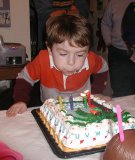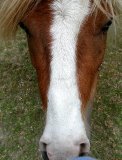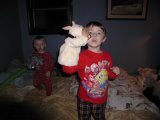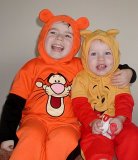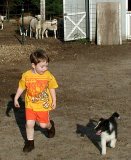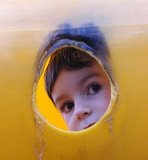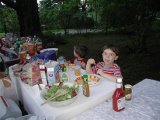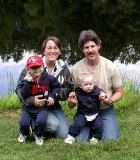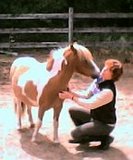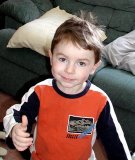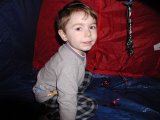
One of the very first reccomendations when starting an RDI program is Slowing Down. You need to get yourself out of "crisis mode" and start taking things one step (one teeny tiny baby step) at a time in order to start making any progress with anything.
Part of this slowing down is dumping other therapies/services, which is VERY hard for parents to do. Afterall, all we ever hear from anyone in the field of Autism is how we have to address this, that, and everything else before some critical age after which the child is deemed eternally hopeless and doomed to a life of isolation and agony. I meet SO many parents that buy into this thought, and who chase the ever-dangling carrot of possible cures, running from therapy to therapy, hoping that this next one, this next session, this next thing will be the cure that removes Autism from their child like a cloak.
Now, I agree, sometimes someone tries something that does seem to magically remove their child's Autism. I will counter that I think in that case, it wasn't really Autism, but rather some process that was mimicking Autism's symptoms. Severe food allergies, allergic reactions to vaccines, heavy metal poisoning, severe gut issues -- these are all things that can produce a set of symptoms that look a lot like Autism. But is it really Autism? If the child suddenly starts acting typical immediately after removing the causative agent, then I don't think it possibly ever could have been Autism. Autism is a divergence in pathways in the brain -- even if you were to remove the orginal thing that cause the brain to start developing in the wrong way, those neural connections are already wrong. They need to be pushed back onto the right path and rebuilt in the right direction in order for the child to slowly start behaving less Autistic. So I don't think you can "cure" Autism (not in that way at least) -- but I do think there are cures for some of the disorders that mimic Autism. But it sure seems like those "cures" are extremely rare.
And I guess parents want to hope that that rare case is going to be THEIR child. And who can blame them for hoping? So they run around exhausting themselves, their child, their family, and their finances hoping for the magic bullet that "fixes" their child. And in the vast majority of cases, they just never find it, because, well, Autism is not curable. If only they could slow down and put their efforts and energy into the long road to remediation. I wish I could duct tape them to a chair and brainwash them into "getting it". But I think it's something that you have to "come" to when you are ready.
First, you need to mourn, and then move beyond your greif. While you are still greiving, I don't think it does you any good to start ANYTHING. It IS a big deal that your child is not "perfect". It IS a big deal that you are going to have to dedicate pretty much every waking minute to Autism for the next who-knows-how-many-years. Dr. Gutstein often says that the road to remediation is a marathon -- you need to learn how to pace yourself and celebrate the little milestones along the way, and you need to PREPARE for the journey.
Next, you need to take a good hard look at and prioritize the therapies that make sense to you. Every child is unique, and so some need more or different therapies to address co-occuring conditions in addition to Autism, some of which may actually present more of a current challenge than the Autism itself. If you've got a kid with such significant physical impairments that they can not physically attend to you, then that needs to be addressed first, or at least with equal importance. If you've got a child with a Seizure disorder, that needs to be regulated first. But for the vast majority of kids with ASD, addressing Autism itself is going to be the top priority and the thing that is going to make progress in other areas more doable. So I put RDI at the top of our priority list. And RDI was enough for quite awhile for us -- we fooled around with Speech and Launguage Therapy, but discovered that RDI was having a bigger positive impact on Jacob's language than SLT was, so we eventually dumped that too. We recently added Sensory Integration back in, but that's after making quite a big of progress with RDI, and finding that Jacob's sensory issues are currently a bigger road block than his Autism. (In fact, at the present time, nearly 2 years into RDI, the vast majority of strangers who meet him on the street won't believe me if I tell them he has Autism. Trust me, we still have a LONG way to go in the remediation process, but even after just 2 years, he's pretty much undistinguishable from typical kids in a casual situation.)
Slowing down also means cutting out a lot of the OTHER stuff we do with our kids. Dance classes, Karate, playdates, and even school. Dragging our poor ASD kids around from class to class just is not in their best interest. Simplifying their schedule and giving them time to process transitions and their daily rhythms is a big part of learning to live the RDI lifestyle. A harried schedule makes just about anyone nuts, but it's particularly hard on a child with ASD.
And then there's slowing down your actual communication with your child. In fact, cutting out pretty much all of the verbal garbage is a good place to start. Learn to communicate with non-verbals, the way typical babies first learn to communicate, long before they have the ability to speak. Point to indicate things, smile to show your pleasure, frown to slow your displeasure. And most importantly, when you DO need to speak, do so slowly, with a minimum of words, and in an Experience-Sharing fashion. Limit prompting and commanding/demanding/requesting -- stop TRYING to get your kid to respond to you. Instead, point out interesting things. "oh look, there's a Robin!" Then wait and give your child time to respond before saying anything else. A common suggested amount of time is about 45 seconds. This gives the ASD child, who has a much slower processing time, a chance to think about and formulate a response. If they don't respond, you could make another statement "I love the orange feathers on his chest!" Or, NOT. It's not about getting your child to respond. It's about modeling experience sharing and talking to them like they are another human being. Because they ARE -- they are not a dog to be commanded around, nor are they an answer box to be quizzed. And more than modeling it, it is actually about EXPERIENCE SHARING with your child. No response required.
All that said, slowing down was one of my hardest objectives, and I'm still struggling with it. Not slowing down Jacob's or my family's life, which I think I've been pretty successful at, not slowing down my communicating style, which I've pretty much mastered (at least around Jacob! Most other people find that hard to believe about me!). My struggle has been slowing down my own hectic, out of control schedule. I have to work, I work too many hours, in addition I am very NOT autistic myself, so I have quite an active social life and many interests and hobbies. I thrive on being overscheduled, and have been this way my entire life. Yet, on a base level, I truly DO desire to slow down. I just don't know HOW or WHAT to cut out of my schedule. I'm a work in progress. Someday my goal is to just sit on my front steps and watch the sun set with no other agenda. Stay tuned to see if I ever get there....

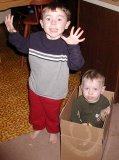 Spotlighting is a very important part of the RDI process. This is something that you do that helps the child encode the important part of an experience. (The important part being something that matches your current RDI obejctives.) A hesitation in your speaking, stuttering your words, gasping, clearing your throat, a smile, an excited squeal -- any of these can be spotlighting. So, for example, if I wanted to spotlight a shared gaze, I might freeze my face in a big smile for a second or two and take a quick breath before continuing on with whatever it is that we're doing.
Spotlighting is a very important part of the RDI process. This is something that you do that helps the child encode the important part of an experience. (The important part being something that matches your current RDI obejctives.) A hesitation in your speaking, stuttering your words, gasping, clearing your throat, a smile, an excited squeal -- any of these can be spotlighting. So, for example, if I wanted to spotlight a shared gaze, I might freeze my face in a big smile for a second or two and take a quick breath before continuing on with whatever it is that we're doing.
